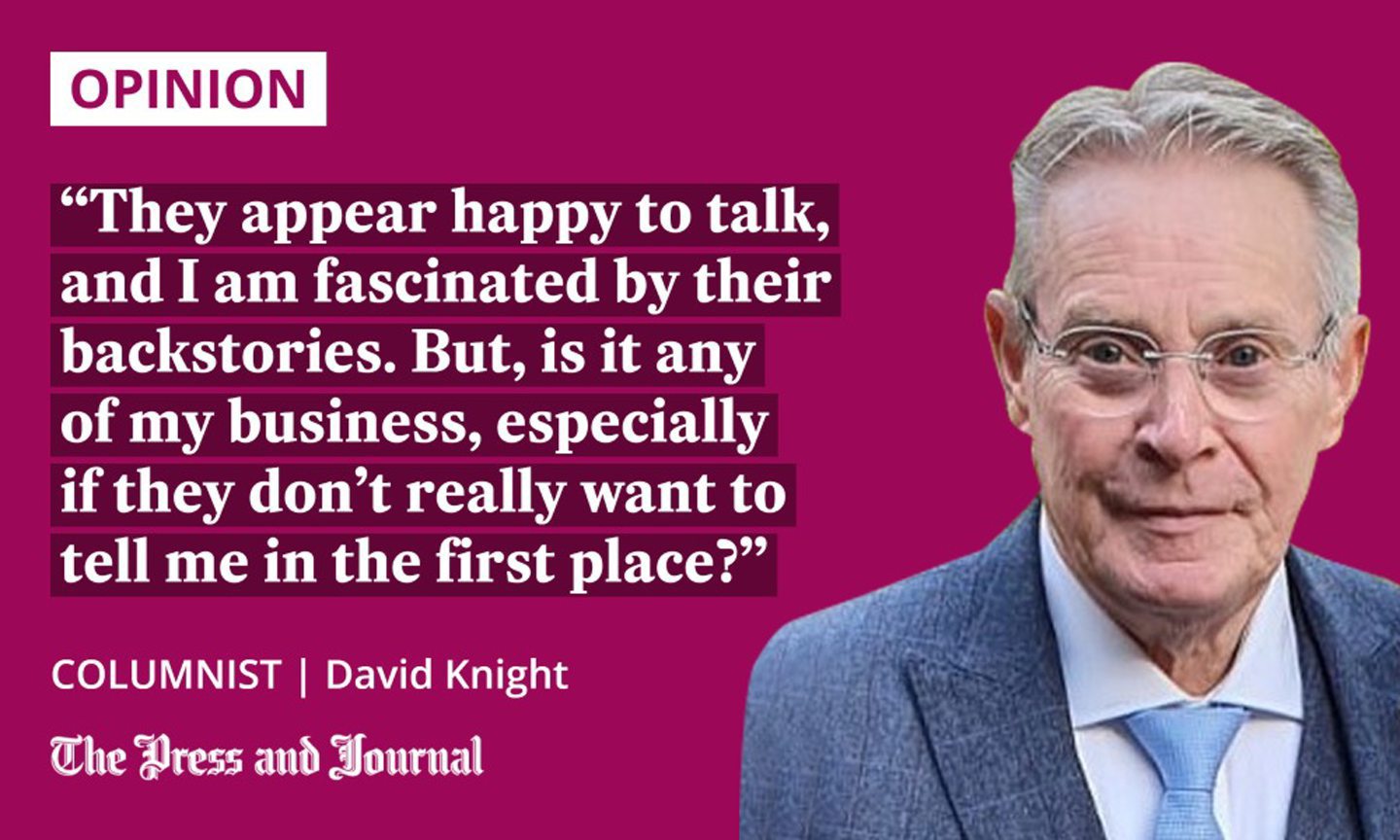Someone might feel forced to answer questions they find intrusive out of politeness. It’s something we should all consider before asking, writes David Knight.
The solicitor sneered at me down the phone: “You’re not from these parts, are you?”
It was a calculated insult. A last resort when losing an argument.
He was low on ammo, and his defence was shaky, but tried one last shot anyway.
We’ve all heard much worse racial or xenophobic abuse, of course.
His was more elegant, while carrying the same malicious intent. Like wrapping a blade in a silk scarf before a stabbing.

He was trying to keep a north-east client’s name out of our paper, despite justified public interest. It was a gift on a plate, really, because he allowed me to set his spurious case aside and concentrate instead on interrogating him over his offensive remark
He wouldn’t have lasted five minutes at a Buckingham Palace soirée.
But the remark still left an emotional scar. It must have done, or why would I remember it with resentment after some years?
Was he cut from the same cloth as Lady Hussey, who resigned from Buckingham Palace after a racism row? Hardly – he was a daft but cunning old man who knew what he was doing.
Intention and perception are awkward bedfellows
Lady Hussey was maybe a bit daft, too, for not knowing. She ploughed on regardless, even though Ngozi Fulani was clearly uncomfortable at being quizzed repeatedly about her historical family origins.
At least, I think that is what the Lady of the Royal Household was driving at.
Mixed feelings about yesterday's visit to Buckingham Palace. 10 mins after arriving, a member of staff, Lady SH, approached me, moved my hair to see my name badge. The conversation below took place. The rest of the event is a blur.
Thanks @ManduReid & @SuzanneEJacob for supportpic.twitter.com/OUbQKlabyq
— Sistah Space (@Sistah_Space) November 30, 2022
What was supposed to be polite small talk turned into another Buckingham Palace race row. Possibly a throwback to a different age, but unacceptable if the bemused recipient genuinely believed it to be unnecessarily intrusive or offensive.
Intention and perception are always awkward bedfellows.
Now, Charles and William are squirming again as Harry and Meghan ruffle their beds on Netflix, with their dubious dying-swan soap opera (or brave battle against intrusion and racism, depending on which camp you’re in).
‘You’re not from these parts, are you?’ was a more loaded version of: ‘Where are you from?’
“You’re not from these parts, are you?” was a more loaded version of: “Where are you from?”
It wasn’t a well-intentioned inquiry about my background.
I can’t vouch for Lady Hussey’s intentions, of course. But, like an irresistible force hitting an immovable object, an inquisitive nature can soon collide with someone not shy at taking offence.
Interrogation never feels good
I felt uneasy that the Queen’s favourite aide, 83, was hung, drawn and quartered by the palace when a spell in the stocks would have sufficed. A genuine, heartfelt public apology for any misunderstanding, and move on.
The new palace line-up seems too frightened of its own shadow for my taste.
But, there was something striking about Lady Hussey’s words. I remembered someone once trying them out on me in another odd episode.
Not in royal surroundings, but a less salubrious setting, on the number one bus in Union Street, Aberdeen.
My wife and I were hopping on and off at various points while shopping. But our conversation was interrupted by one of those strange, vaguely threatening people who make public transport so perpetually unappealing.
Our fellow passenger swivelled round and bawled me: “Where are you from?” It hung in the air like an unexploded hand grenade.
Which way was this going? And I’m trapped on a bus.
So, I smiled and shot back: “I’m from Aberdeen.” This was technically true, but anyone with a passing interest in accents would know I was not born and bred.
“Nah, come on…” he insisted, “Where are you really from?” He was getting worked up, so we hopped off.
If your motives are honourable, is it OK to ask?
It’s all very well for those mixing in privileged circles to kick up a fuss, but it’s different on a bus. Or in a racist workplace or school playground. Or at a father’s knee, where racist words are absorbed as fast as nursery rhymes.
As it happens, I am reassessing my behaviour, too, after the Lady Hussey hullabaloo.
Do they feel under unnecessary pressure to reply?
I am always asking complete strangers from “other parts ” where they are from. Waiters and tradespeople, mainly.
Any hint of an accent and I’m in like a shot; I’m a journalist, after all.
They appear happy to talk, and I am fascinated by their backstories. But, is it any of my business, especially if they don’t really want to tell me in the first place?
People are naturally curious and inquisitive, so where’s the harm, if your motives are honourable?
I am doubting myself, because I have an unfair advantage on these occasions. As a paying customer, I am usually buying coffee or hiring them to cut my garden hedge. So, do they feel under unnecessary pressure to reply?
It seems a shame to stifle natural human interaction, yet maybe I should stop imposing on them.
Or am I being too sensitive in a touchy world?
David Knight is the long-serving former deputy editor of The Press and Journal



Conversation